|
|
SUBJECTS |
TITLES |
AUTHORS |
PUBLISHERS |
EXERCISE BOOKS |
|
1 |
ENGLISH LANGUAGE |
Mastery English |
EgbeBesong Elvis |
NMI |
200 Ledger |
|
2 |
LITERATURE IN ENGLISH |
Silas Marner(Prose) |
G.Eliot |
ANUCAM |
300 ledger |
|
As You Like It (Drama) |
SHAKESPEARE |
ANUCAM |
|
||
|
3 |
FRENCH LANGUAGE |
Axe du Français |
NkoaTsimi and others |
L’HARMATTAN CAMEROON |
300pg |
|
4 |
LOGIC |
The Essential of Logic for Ordinary Level |
Ngwonam Denis |
GRASSROOTS PUBLISHERS |
200 Ledger |
|
4 |
HISTORY |
Effective Modern History for Colleges Forms 3,4 and 5 |
Batey George Eno |
DOVE |
500 ledger |
|
5 |
GEOGRAPHY |
21st Century Applied Physical Geography and Map work for forms 3, 4 and 5 |
NCHANGVI Sebastian |
GRASSROOTS PUBLISHERS |
300 ledger |
|
6 |
CITIZESHIP |
Citizenship Education Made Simple |
Hannah Monono |
DOVE |
80 leaves |
|
7 |
ECONOMICS |
Masterpiece Economics |
FORBE H./NGAGNCHI and others |
GRASSROOTS PUBLISHER |
300 ledger |
|
8 |
COMMERCE |
New Ordinary Level Commerce for Cameroon |
Bartholomew Bushu |
CATWA |
200 ledger |
|
9 |
MATHEMATICS |
Interactions in Mathematics |
A.T.TAMAMBANG |
CAMBRIDGE |
300 register calculator |
|
10 |
PHYSICS |
O/Level Physics:A Modern Approach |
MPAKO IVO |
GRACE PUBLISHERS |
300 ledger |
|
11 |
CHEMISTRY |
Understanding Chemistry |
NJIKE N. |
SHILOH PRINTS |
300 ledger |
|
12 |
BIOLOGY |
Understanding Biology Vol1 |
TAPONG S. |
GREEN WORLD PUB |
300 ledger |
|
13 |
COMPUTER SCIENCE |
Gateway to Computer Science |
Conrad V.N. |
LEGEND |
200 ledger |
|
14 |
ADDITIONAL MATHS |
Explaining Additional Mathematics |
ATANGA A. |
NAARAT |
200 register |
|
15 |
HUMAN BIOLOGY |
Understanding Biology Vol 2 |
TAPONG S. |
GREEN WORLD PUB |
300 ledger |
SOME DESERT EROSIONAL FEATURES BELOW
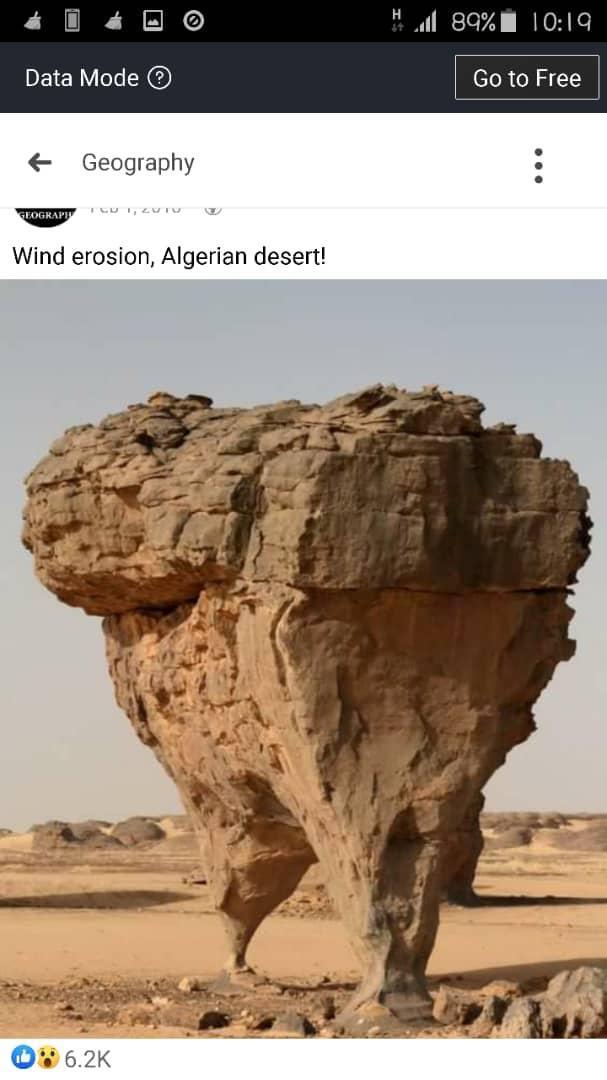
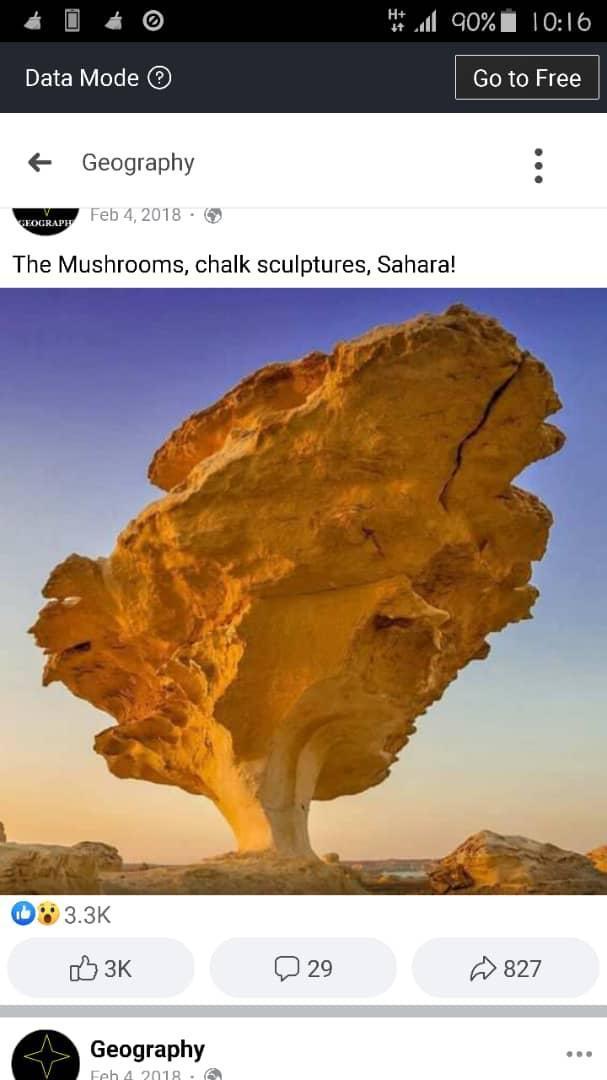
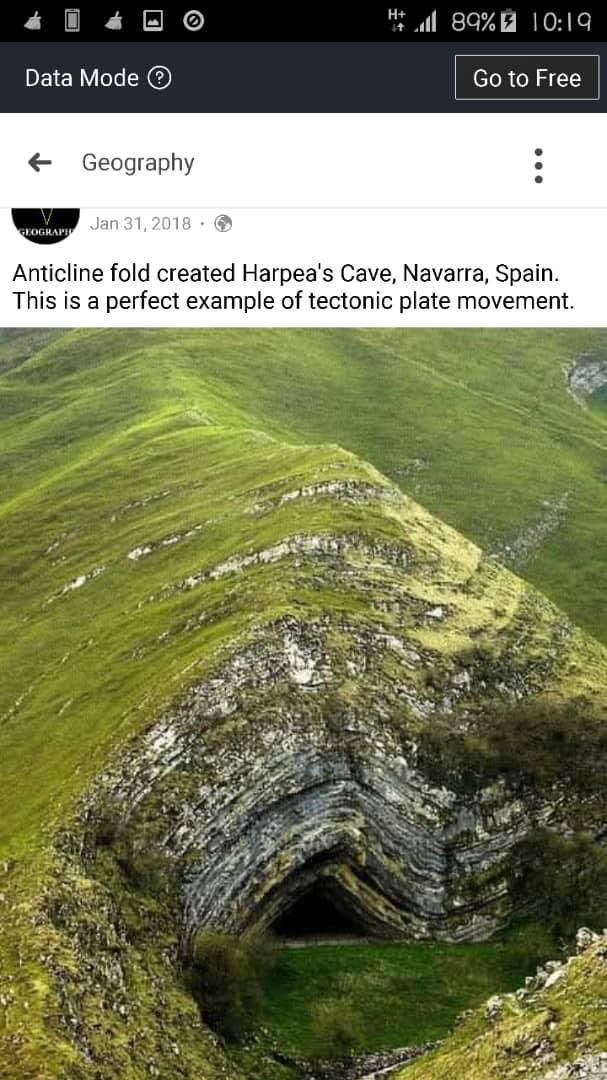
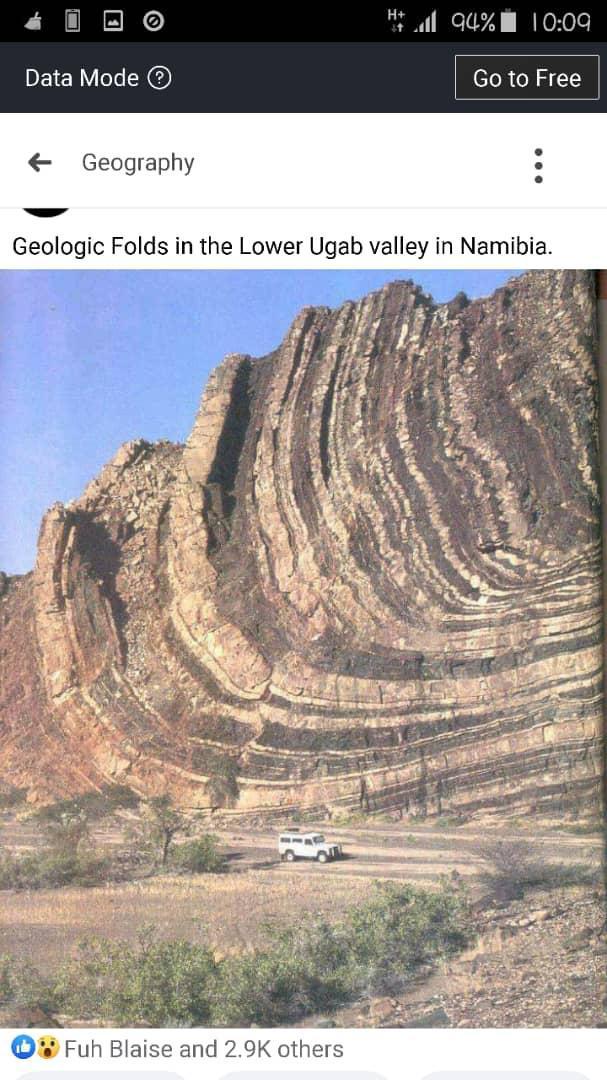
1) Rock pedestal form as a result of abrasion
2) Rock pedestal or Mushroom Rock
3) A cave form as a result of anticlinal folds ( Are some geological features form as a results of folding)
4) A folded strata (( Are some geological features form as a results of folding)
Questions for revision
QUESTIONS 1: TRANSLATION: Translate into French.
John arrived home late that night. He looked tired and hungry. He went straight into the bathroom and took a bath. Then he was served a meal which he ate without appetite. Soon after, he went to bed. He slept like someone who had spent the whole night drinking. The day before, he had gone to Douala early, in the hope of returning home in time. Unfortunately, he had left Douala in a seventy-seater bus, at about10 p.m. The journey was smooth until mid-way , when the vehicle had a flat tyre.
That was when his problems began. Some passengers started asking the driver to sell the bus and buy good tyres. Others declared that he would be held responsible if theives attacked them. The repairs took quite some time. After that, the travellers entered the bus and continued their journey..
QUESTION 2: ESSAY
Using a tense suitable to your topic, write an essay in French of at least 140 and not more than 150 words( not counting figures, abbreviations and names of people and places) on one of the following topics. If you choose topic (b), the letter, your name must be Achu and your address Lycee de Mouanko. Use a different nane and/or address will be seriously penalized. This also holds true for details that can help reveal your true identity, school or family. The usual introduction to the letter must not be more than 20 words. Credits will be given for use of a variety of expressions, verbs, vocabulary and idioms. Off-topic material will earn no marks.
a) Lors d'un voyage que vous effectuiez un jour avec un (e) camarade, votre voiture est tombee en panne, loin de la ville, alors qu'il se faisait tard. Dites ce que vous avez fait par la suite.
b) Ecrivez une lettre a votre parent pour lui dire que vous avez ete renvoye de l'ecole pour non paiement des frais de scolarite.
THE PRINCIPAL
SAMUEL NGUBE
WEEK BEGINNING 23RD TO 27TH MARCH 2020
GEOLOGY FOR FORM 5SCE.
Subject: Geology
Class: Form 5
Topic: Introduction to geological map work
Lesson: Identification of geological features on a geological map.
These features include;
1) Horizontal beds
Identify when bedding planes run parallel to topographic contours.
2) Folded beds
They are identified from a repetition of similar beds on both sides of a core bed.
If the core bed is the oldest, the fold is an anticline, as well as dip arrows pointing away from each other.
If the core bed is the youngest then the fold is a syncline, as well as dip arrows pointing towards each other.
3) Faulted beds
It’s represented by a thick black line.
4) Intrusions
a) dykes: They cuts across stratification
b) Sills: They occurs between bedding planes
c) volcanic plugs, bosses shows a circular outcrop pattern.
All these features are summarized in the map below
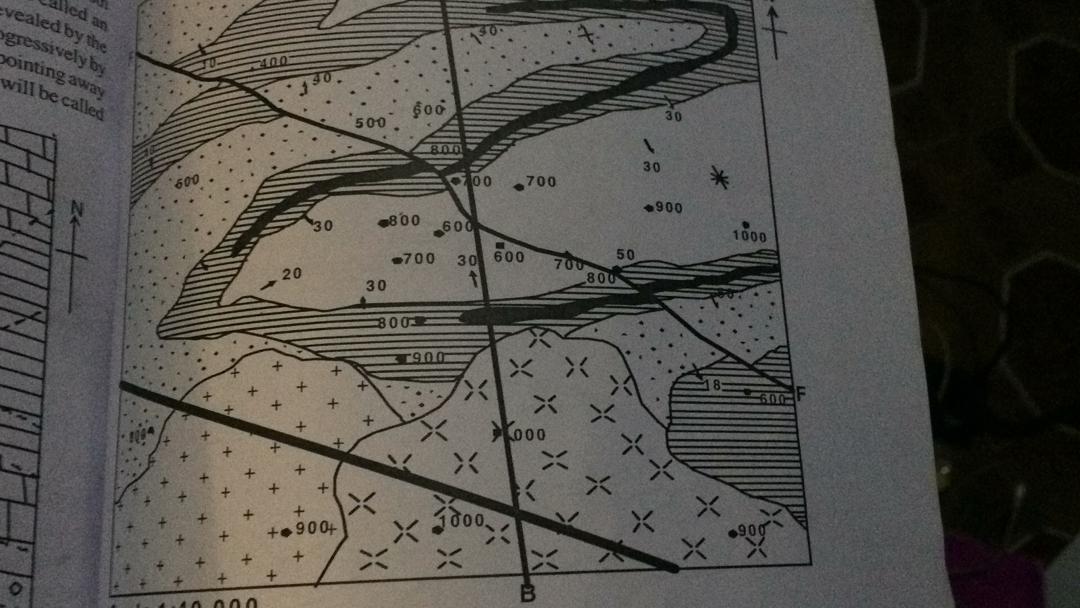
WEEK BEGINNING 23RD TO 27TH MARCH 2020
FORM 5 SCIENCE REVISION QUESTIONS
1A) Define the following geographical terms
i) weathering
ii) Volcanicity
iii) Hydrological cycles
iv)) Ocean current (8mks)
B) briefly describe the inter-relationship that exist between climate, soil, and vegetation in the tropical grassland region (6mks)
c) Explain three causes of global warming ( 6mks)
2) USE diagrams and examples where appropriate and
a) Show the likely features to be found on the flood plain of a river (8mks)
b) Show two way by which weathering destroys the landscape (4mks)
c) Describe any two of the following
i) The effects of latitude on temperature
ii) four proofs that the earth is spherical in shape
iii) The effects of the earth’s notation
iv) Occurrence of hot deserts (8mks)
3a) Compare the characteristics of intensive and extensive farming (4mks)
b) Describe three ways by which any one of the following resources ( fish, forest or minerals) in being preserve in the world
c) Account for the growth in the volume of tourist in the world today (5mks)
di) Define the term newly industrialized countries (2mks)
ii) State three reasons for the rapid development of the manufacturing industries in these countries or areas ( 3mks)
4 ai) Name and locate two fertile and two infertile soils in Cameroon
ii) briefly explain how the main vegetation types of Cameroon are related to the various climates in the country (8mks)
bi) State and explain four reason for the slow rate of industrial development in Cameroon
ii) outline four importance of agriculture to Cameroonians
iii) choose one of the above mentioned resources and state three uses of the resources and outline three ways by which the resources can be managed sustainably (4mks)
WEEK BEGINNING 23RD TO 27TH MARCH 2020
LOGIC LESSON: F5A/B.
Lesson Title: Introduction To Symbolic Logic.
Definition: symbolic logic is formal logic in which we use symbols to express an idea or ideas.
Symbolic logic is a branch of formal logic that studies the meaning and relationship of statements via precise mathematical methods and rules of inference.
Symbolic logic was founded by GOTTLOB FREGE. It is mathematical in origin, and mathematical in techniques and method. Hence, it is also known as Mathematical Logic.
IMPORTANCE OF SYMBOLIC LOGIC.
1.It is an instrument for making transitions in reasoning almost mechanically.
2.It serves as short_hand to express a proposition or argument (idea).
3.It provides a penetration and fruitful analysis of internal structure of statements and argument.
SIMILARITIES BETWEEN ARISTOTELIAN LOGIC AND SYMBOLIC LOGIC.
1. Both are deductive and formal.
2. Both types are mathematical in approach.
Mr. Achalle
WEEK BEGINNING 23RD TO 27TH MARCH 2020
Collocations
A collocation is made up of two or more words that are commonly used together in English. Think of collocations as words that usually go together. There are different kinds of collocations in English. Strong collocations are word pairings that are expected to come together, such as combinations with 'make' and 'do': You make a cup of tea, but you do your homework. Collocations are very common in business settings when certain nouns are routinely combined with certain verbs or adjectives. For example, draw up a contract, set a price, conduct negotiations, etc.
Collocation Examples
Here are a number of common collocations in English:
To make the bed I need to make the bed every day.
To do homework My son does his homework after dinner.
To take a risk Some people don't take enough risks in life.
To give someone advice The teacher gave us some advice on taking tests.
Verb Collocations
Some of the most common collocations involve verb + noun collocations used in everyday situations. Here are some examples of the types of verb collocations you will need as you continue learning English.
- To feel free :Please feel free to take a seat and enjoy the show.
- To come prepared: Make sure to come prepared for the test tomorrow.
-To save time: You'll save time if you turn off your smart phone and concentrate on the lesson.
-To find a replacement: We need to find a replacement for Jim as soon as possible.
- To make progress: We're making progress on the project at work.
-To do the washing up: I'll do the washing up and you can put Johnny to bed.
Business Collocations
Collocations are often used in business and work settings. There are a number of forms including adjectives, nouns and other verbs that combine with keywords to form business expressions. Here are some business collocations for specific situations.
-To open an account: Would you like to open an account at our bank?
- To forgive a debt :Do you think the bank would forgive a debt?
- To land a deal: We landed a deal worth 3 million francs.
- To key in a PIN: Just key in your PIN at the ATM and you can make a deposit.
- To deposit a check: I'd like to deposit this check of 100frs.
- Hard-earned money : Once you get a job, you'll know what hard-earned money really is.
- To close a deal : I closed a deal on a new account last week.
- To write up a contract : Let's write up your contract.
counterfeit money Be on the lookout for counterfeit money in circulation.
Common Expressions
Collocations are often used as short expressions to describe how someone feels about a situation. In this case, collocations can be used in the adjective form, or also as emphatic expressions using an intensifier and a verb. Here are a few examples using some common collocations:
positively encourage someone to do something. We'd like to positively encourage you to buy this stock.
Deeply regret the loss of someone / something. I deeply regret the loss of your loved one.
To go to great lengths to do something He went to a great length to explain the situation.
You can learn collocations from a number of resources. Academics and teachers like to use collocation databases to help study common collocation uses. However, for students one of the best tools is a collocation dictionary. A collocation dictionary is different from normal dictionaries in that it provides you with collocations commonly used with key words rather than a definition. Here is an example of a few of the collocations used with the verb 'progress':
Progress
Adverb: nicely, satisfactory, smoothly, well -
You are progressing smoothly in this course. | further - As you further progress, you will learn more.
Verb + Progress: fail to - He's failing to progress at work.
Prepositions: beyond - She failed to progress beyond high school. | from, through -
Students should progress from this class with an improved knowledge of the subject.